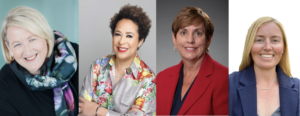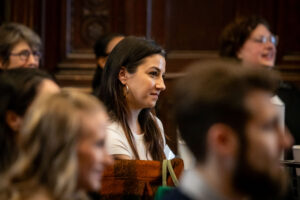Panel answers question: What’s it like to be a woman in a man’s world?

Coming off a Covid hiatus last year, the “Women in Power” event addressed the work-life balance, said Catherine Sabol, partner in the professional services firm Citrin Cooperman, which presents the annual networking event at Manhattanville College’s Reid Castle with Westfair Communications Inc., parent company of the Westfair Business Journal.
“This year we wanted to focus on women in a field dominated by men,” added Sabol, who on Wednesday, Jan. 24, moderated a panel that included Cheryl McKissack Daniel, president and CEO of McKissack & McKissack, the oldest minority/women-owned design and construction firm in the United States; Dr. Joan Fallon, founding CEO of Curemark a boutique biopharmaceuticals company in Rye; and Diane Kelly, president of Greenwich Hospital and executive vice president of Yale New Haven Health.
While each of these women has forged her own path, they said they drew courage, inspiration and wisdom from those in their inner circles – family and friends, often men.

This was never clearer than in the fascinating story Daniel charted. Descended from a slave, who arrived in America in 1790 and learned to lay bricks, Daniel counts among her ancestors’ master carpenter Moses McKissack and Moses McKissack II, the first licensed Black architect in the United States. She and her twin sister would draw on that pedigree as engineering students at Howard University in Washington, D.C., where she earned a bachelor’s and a master’s degree in civil engineering. Howard was, she said, the beginning of her education in what it was like to be a Black woman in that field.
Though it has taken the 119-year-old McKissack & McKissack, which has an office in Mount Vernon, “100 years to become an overnight success,” Daniel said, a success it is, with $50 billion in construction contracts in the past decade alone and a portfolio that includes the New Terminal One at JFK International Airport, LaGuardia Airport Central Terminal Building Redevelopment, Coney Island Hospital Campus Renovation, Harlem Hospital Center Modernization, New York City Economic Development Corp., HuntsPoint Conservative Market, Fulton Fish Market, MART125 Cultural Center projects, Atlantic Yards (Pacific Park), the Long Island Rail Road Yard Relocation, Columbia University Manhattanville Extension, Henry J. Carter Specialty Hospital & Skilled Nursing Facility and The Studio Museum in Harlem. McKissack is the first woman and the first Black to chair the New York Building Foundation.
“I don’t know how I can top anything you just said,” Fallon remarked when it was first her turn to speak. But her own story was compelling in a different way. A lover of medicine, children and baseball – she served on the Americans with Disabilities Act Board of Advisors for the building of the new Yankee Stadium – she noticed that while autistic children were all different, they all ate the same things, a diet high in carbohydrates, because they had low levels of an enzyme that processes protein.
“About 65% of children with autism have this,” she said. She thought there was a connection. What she didn’t think about was that she should patent her idea, until her brother, an inventor who created the precursor to GPS, told her she should. Though the right to hold patents is part of the Constitution, few women and minorities patent their ideas.
“I think this goes back to women not taking ownership of their ideas,” Fallon said. (And also of society not letting them, as the panel addressed the common experience in the corporate world of a man getting attention for the same idea a woman first presented.)
Fallon – who holds a Bachelor of arts degree from Franklin and Marshall College, a D.C. degree from Palmer University and has completed her work for a Master of Science degree in clinical investigation from Harvard University’s joint program with Massachusetts General Hospital – took her brother’s advice and ran with it. Today she holds more than 400 patents, and her company includes a phase III clinical-stage research program for autism, as well as programs focused on Parkinson’s disease, schizophrenia and addiction.

For Diane Kelly, family proved an inspiration – in reverse. “I didn’t want to be a nurse or a doctor, because they expected me to,” she said. But in college, a job as a nursing assistant to earn extra money turned into a love affair with the nursing profession. It was a pivotal moment that led her to combine a passion for numbers (she graduated from Western New England College with an MBA); and one for nursing (a bachelor’s degree from the University of Massachusetts at Amherst, a doctorate in nurse practice from the University of San Francisco) and rise from staff nurse to COO at Berkshire Medical Center before joining Greenwich Hospital in 2018.
“You have to listen to yourself,” Kelly said – what Fallon seconded as a “whole body yes.” “Nobody knows you like you do.”
This integrated, intuitive approach, which has traditionally been associated with women, has often been poohpoohed in the business world as touchy-feely. But the panel said it was absolutely key to be in touch with your instincts and to connect with others in the most transparent way.
For Kelly, this would be crucial when Covid hit the health-care world hard. “I felt it necessary to tell the (Greenwich Hospital) staff we didn’t know,” she said. “I told them, ‘I’m going to tell you what I know when I know it and, if that changes, I’m going to tell you that.’ Then I thought, OK, we’re going to do this together.”
Daniel faced her own moment of truth in 2013 when a disconnect between revenues and actual profits – and a CFO who disguised his drinking with vodka in a Poland Spring water bottle – led to financial chaos in her company. She went to her bank and came clean, laying out everything that had happened and what she was doing to correct it. When she and her team turned the company around 18 months later, the bank singled it out as the poster child for fiscal resurrection.
Stories like these led the audience of 100 to punctuate the breakfast meeting, which was supported by Oasis Day Spa in Dobbs Ferry, with applause. Indeed, Fallon spoke for many in the audience when she said: “I’ve spoken on a lot of panels in my time, but this is some of the most sage advice I’ve ever heard.”